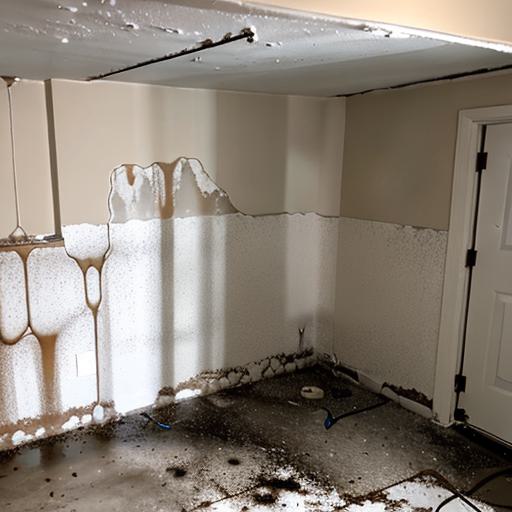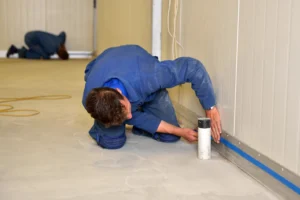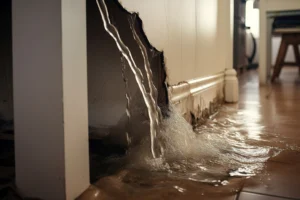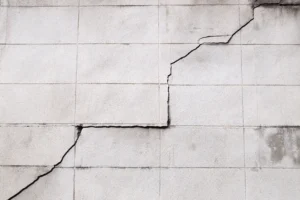When basements get wet it’s not long before you will see the growth of mold and mildew. Molds have the potential to cause health problems. Molds produce allergens (substances that can cause allergic reactions), irritants, and in some cases, potentially toxic substances (mycotoxins).
The most publicized mold is stachybotrys, which has been linked to cancer and other adverse health effects. More common types such as Aspergillus, Ascospore, Basidospore, Cladosporium, Curvularia, and Penicillium, can also be hazardous. Stachbotrys is commonly known as “Black Mold’ has been the subject of sensational headlines in the news. Inhaling or touching mold or mold spores may cause allergic reactions in sensitive individuals.
This fungus has been documented to emit trichothecene mycotoxin satratoxin-H, which, if inhaled is posionus. Stachybotrys grows on drywall and other cellouse products.
Mold can access and irritate people and animals in a variety of ways. We inhale mold spores into our lungs when we breathe. This is why it’s important to use proper protection when you clean up even relatively minor patches of mold. Those who are sensitive should leave this to a professional. Mold can get on the skin where it may not cause a direct problem, but once the face is touched with mold contaminated hands, the mold spores can be inhaled or swallowed or get into eyes and ears.

Dangerous mold in the basement can be harmful to the health
Contact lens wearers have reported contracting a fungal infection called Fusarium Keratitis in their eyes through the use of mold contaminated contact lenses. If the person infected does not receive the proper eye drop treatment which may last up to three months, the infection can scar the cornea.
Allergic reactions to mold are common. They include hay fever-type symptoms, such as sneezing, runny nose, red eyes, and skin rash (dermatitis). Exposure can also cause nervous system problems, such as headaches and tremors, depression and memory loss, fatigue, lack of energy, dizziness, nausea, digestive problems, reduced immune system. Allergic reactions to mold can be immediate or delayed. mold can also cause asthma attacks in people with asthma who are allergic to mold. In addition, mold exposure can irritate the eyes, skin, nose, throat, and lungs of both mold-allergic and non-allergic people. Some studies claim that exposure to high levels of mycotoxins can lead to neurological problems and in some cases death.
RISKS TO PETS It has been shown that dogs, cats, birds, and other pets also have a sensitivity to Mold toxicity and may suffer effects similar to those experienced by people. For longed exposure of animals to molds shows effects including increased susceptibility to infectious diseases that can harm the intestinal tract, skin, or lungs, depending on how and what parts of the body were exposed. If the respiratory tract is affected, bacteria or viruses may not be easily cleared, and there may be a greater susceptibility to cancer.
Basement flooding should be dealt with as soon as possible, by professionals. Growth of bacteria and mold is extremely likely within 24-48 hours, especially in warm temperatures. If the water level rises above the floor to the wall, mold has an excellent chance of growing behind the wallboard, in which case the moldy materials (wallboard and insulation)should have mold removal.
You may suspect hidden mold if a building smells moldy, but you cannot see the source, or if you know there has been water damage and residents are reporting health problems. Mold may be hidden in places such as the back side of dry wall, wallpaper, or paneling, the top side of ceiling tiles, the underside of carpets and pads, etc. Other possible locations of hidden mold include areas inside walls around pipes (with leaking or condensing pipes), the surface of walls behind furniture (where condensation forms), inside ductwork, and in roof materials above ceiling tiles (due to roof leaks or insufficient insulation).If a residence is severely mold contaminated, it cannot be lived in or sold until mold removal has been done.
For mold removal in your basement DryMaster Basement Waterproofing, LLC uses an all-purpose cleaner, deodorizer, disinfectant, sterilizer, fungicide, virucide, algaecide, bacteriostat, and MILDEWSTAT for use anywhere human health is at risk. It’s a safe non-toxic, non-flammable, biodegradable quaternary product with no waste disposal problems.
WE USE GREEN SOLUTIONS FOR MOLD, FUNGUS, AND ODOR CONTROL



